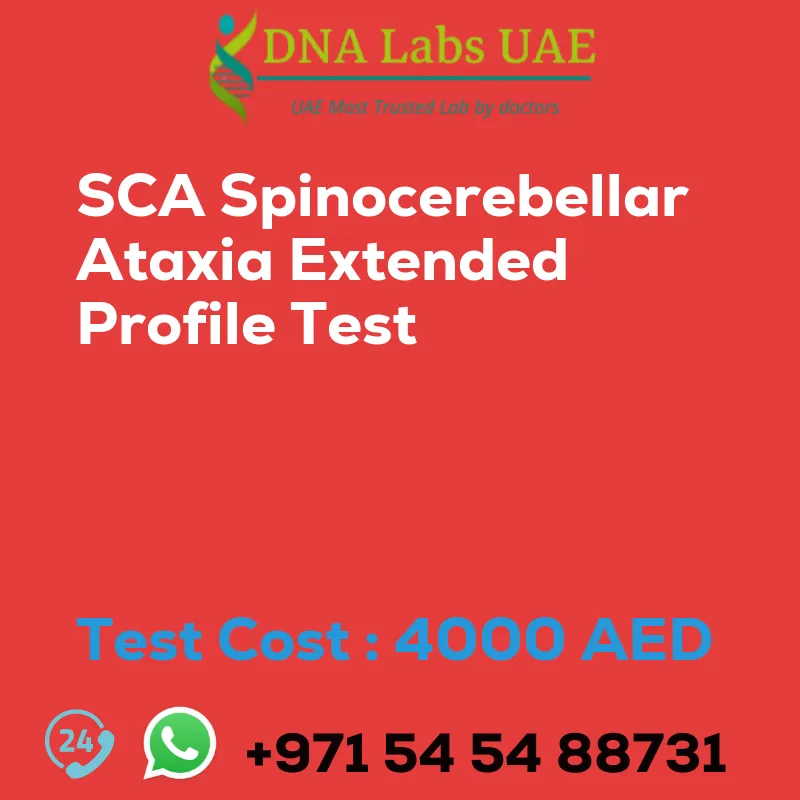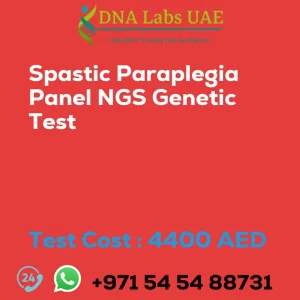SCA Spinocerebellar Ataxia Extended Profile Test
Test Cost: AED 4000.0
Test Components:
- SCA1
- SCA2
- SCA3
- SCA5
- SCA6
- SCA7
- SCA8
- SCA11
- SCA12
- SCA14
- SCA17
- SCA23
- DRPLA
- FXTAS
Price: 4000.0 AED
Sample Condition: 4 mL (2 mL min.) whole blood in 1 Lavender top (EDTA) tube. Ship refrigerated. DO NOT FREEZE. Duly filled Genomics Clinical Information Requisition Form (Form 20) is mandatory.
Report Delivery: Sample Tue by 11 am; Report Sat
Method: PCR, Fragment Analysis
Test Type: Neurologic Disorder-Ataxia
Doctor: Neurologist
Test Department: MOLECULAR DIAGNOSTICS
Pre Test Information: Duly filled Genomics Clinical Information Requisition Form (Form 20) is mandatory.
Test Details
SCA (Spinocerebellar Ataxia) is a group of genetic disorders that affect the cerebellum, a part of the brain responsible for coordination and balance. The condition is characterized by progressive loss of coordination and balance, leading to difficulty in walking, speaking, and performing daily activities. There are several types of SCA, each caused by a different genetic mutation.
Symptoms
The symptoms of SCA can vary depending on the type of mutation involved. However, some common symptoms of SCA include:
- Progressive loss of coordination and balance
- Difficulty in walking, running, and performing daily activities
- Slurred speech and difficulty in swallowing
- Tremors and involuntary movements
- Nystagmus (involuntary eye movements)
- Cognitive impairment and memory loss
- Depression and anxiety
- Fatigue and weakness
Diagnosis
The diagnosis of SCA involves a combination of physical examination, medical history, and genetic testing. The doctor may perform a neurological examination to check for signs of balance and coordination problems. Imaging tests such as MRI or CT scan may be used to evaluate the brain structure and rule out other conditions. Genetic testing is the most definitive method to diagnose SCA, and it involves analyzing a sample of blood or saliva to look for specific genetic mutations.
Treatment
There is currently no cure for SCA, and treatment is mainly focused on managing the symptoms. Medications such as anticonvulsants and antidepressants may be prescribed to control tremors and improve mood. Physical therapy and occupational therapy can help improve balance and coordination, and assistive devices such as walkers or canes may be recommended to aid mobility. In some cases, surgery may be considered to treat severe tremors or spasticity.
Prognosis
The prognosis for SCA varies depending on the type of mutation involved. Some types of SCA progress slowly and may not significantly affect life expectancy, while others can lead to severe disability and reduced lifespan. In general, the earlier the onset of symptoms, the more severe the disease course. However, with proper management of symptoms, people with SCA can maintain a good quality of life and continue to engage in daily activities for many years.
| Test Name | SCA SPINOCEREBELLAR ATAXIA EXTENDED PROFILE Test |
|---|---|
| Components | *SCA1, *SCA2, *SCA3, *SCA5, *SCA6, *SCA7, *SCA8, *SCA11, *SCA12, *SCA14, *SCA17, *SCA23, *DRPLA, *FXTAS |
| Price | 4000.0 AED |
| Sample Condition | 4 mL (2 mL min.) whole blood in 1 Lavender top (EDTA) tube. Ship refrigerated. DO NOT FREEZE. Duly filled Genomics Clinical Information Requisition Form (Form 20) is mandatory. |
| Report Delivery | Sample Tue by 11 am; Report Sat |
| Method | PCR, Fragment Analysis |
| Test type | Neurologic Disorder-Ataxia |
| Doctor | Neurologist |
| Test Department: | MOLECULAR DIAGNOSTICS |
| Pre Test Information | Duly filled Genomics Clinical Information Requisition Form (Form 20) is mandatory. |
| Test Details |
SCA (Spinocerebellar Ataxia) is a group of genetic disorders that affect the cerebellum, a part of the brain responsible for coordination and balance. The condition is characterized by progressive loss of coordination and balance, leading to difficulty in walking, speaking, and performing daily activities. There are several types of SCA, each caused by a different genetic mutation. Symptoms: The symptoms of SCA can vary depending on the type of mutation involved. However, some common symptoms of SCA include: 1. Progressive loss of coordination and balance 2. Difficulty in walking, running, and performing daily activities 3. Slurred speech and difficulty in swallowing 4. Tremors and involuntary movements 5. Nystagmus (involuntary eye movements) 6. Cognitive impairment and memory loss 7. Depression and anxiety 8. Fatigue and weakness Diagnosis: The diagnosis of SCA involves a combination of physical examination, medical history, and genetic testing. The doctor may perform a neurological examination to check for signs of balance and coordination problems. Imaging tests such as MRI or CT scan may be used to evaluate the brain structure and rule out other conditions. Genetic testing is the most definitive method to diagnose SCA, and it involves analyzing a sample of blood or saliva to look for specific genetic mutations. Treatment: There is currently no cure for SCA, and treatment is mainly focused on managing the symptoms. Medications such as anticonvulsants and antidepressants may be prescribed to control tremors and improve mood. Physical therapy and occupational therapy can help improve balance and coordination, and assistive devices such as walkers or canes may be recommended to aid mobility. In some cases, surgery may be considered to treat severe tremors or spasticity. Prognosis: The prognosis for SCA varies depending on the type of mutation involved. Some types of SCA progress slowly and may not significantly affect life expectancy, while others can lead to severe disability and reduced lifespan. In general, the earlier the onset of symptoms, the more severe the disease course. However, with proper management of symptoms, people with SCA can maintain a good quality of life and continue to engage in daily activities for many years. |







